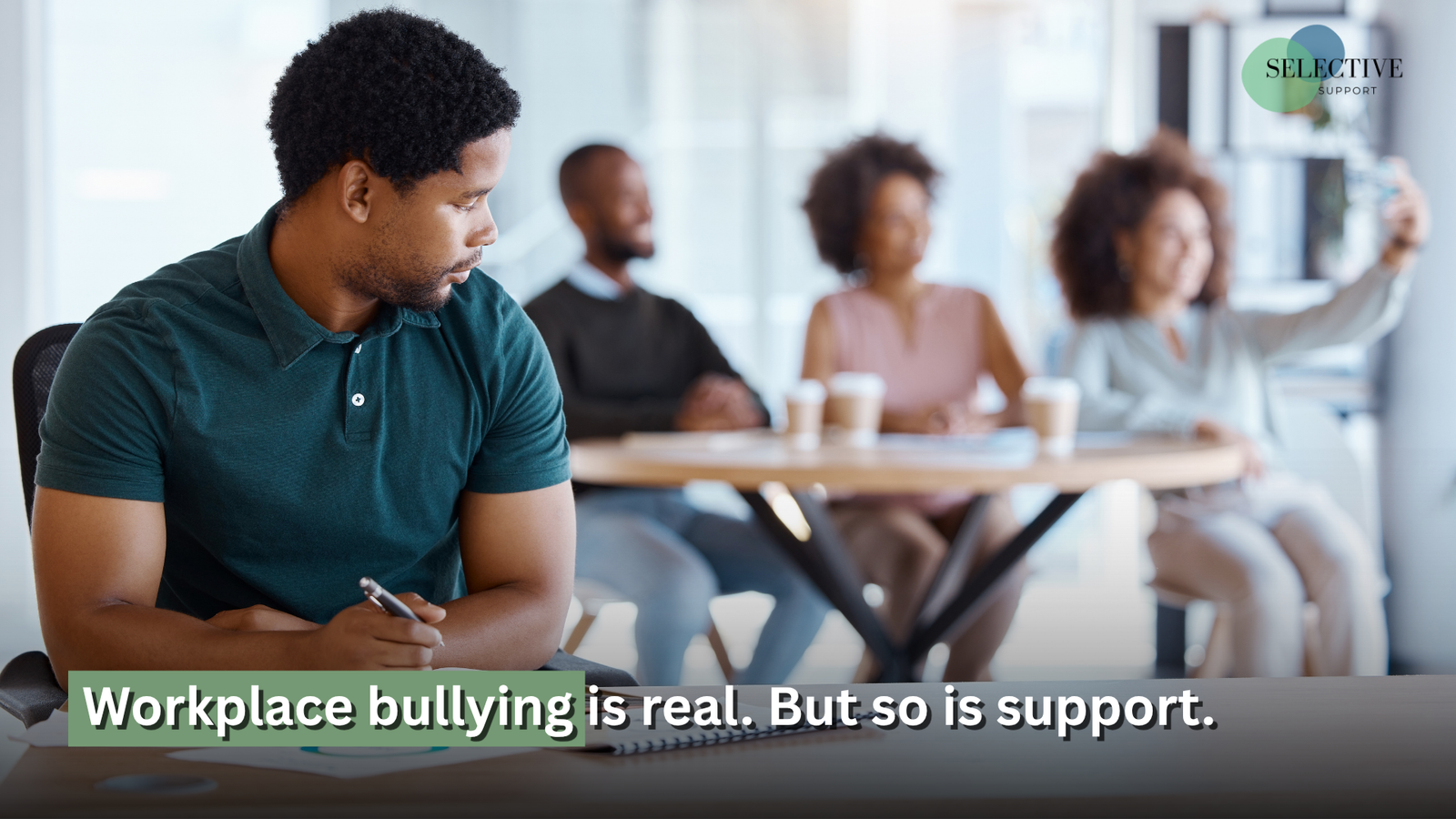What Is Bullying in the Workplace? 3 Ways Your EAP Can Help
Have you ever left work feeling drained, not from the tasks, but from how you were treated?
If you’ve ever been excluded from meetings, constantly criticised, or belittled in front of others, you might be wondering what is bullying in the workplace and whether what you’re experiencing is something more serious.
You’re not imagining it. Nearly 1 in 2 Australian workers say they’ve witnessed or experienced workplace bullying—yet many still suffer in silence. The good news? You don’t have to.
In this blog, we’ll break down what workplace bullying really looks like and share three ways your EAP program can support your mental health, guide you through conflict, and help you take control again.
How to Recognise Workplace Bullying and Its Effects on Mental Health
Workplace bullying isn’t always loud or obvious, and that’s what makes it so harmful. At its core, bullying is repeated, unwanted behaviour that causes a person to feel intimidated, humiliated, or threatened. It often involves a misuse of power and can be verbal, physical, social, or psychological.
Some common forms of workplace bullying include:
- Constant put-downs, sarcasm, or unfair criticism
- Being left out of meetings or group chats on purpose
- Threats about job security
- Micromanagement or setting you up to fail
- Gossiping or spreading false rumours
- Shouting, intimidation, or aggressive body language
It can also look like being ignored, dismissed, or undermined, especially in front of others. These behaviours might seem “just part of the job” or brushed off as tough management, but if it’s persistent and makes you feel unsafe or stressed, it’s bullying.
The impact on your wellbeing can be serious. Many people report:
- Heightened anxiety or constant dread before work
- Trouble sleeping or focusing
- Loss of confidence and self-esteem
- Emotional exhaustion or burnout
- Headaches, stomach issues, or other physical symptoms
This is where EAP mental health support plays a vital role. If any of this sounds familiar, your EAP program is there to listen, guide, and help you feel more in control again.
You’re not imagining it—and you don’t have to go through it alone.
If this section resonates with you, please know: your EAP counselling service is here for you, confidentially and without judgement.

3 Powerful Ways Your EAP Program Can Help You Respond
If you’re experiencing bullying at work, it’s natural to feel unsure about what to do next. That’s where your Employee Assistance Program (EAP) comes in. Whether you need someone to talk to, tools to cope, or guidance on how to take action, your EAP is a confidential, supportive place to start.
Case Study: How Sarah Found Support Through Her EAP
Kyla, a team leader at a busy marketing firm, started experiencing repeated unfair criticism and exclusion from a colleague. Feeling anxious and isolated, she wasn’t sure how to handle the situation without risking her job. Sarah reached out to her company’s EAP program and booked confidential counselling sessions.
Her counsellor provided a safe space to talk openly, helping Sarah understand her feelings and rebuild her confidence. Through tailored coaching, Sarah learned assertiveness techniques and how to set clear boundaries. When she was ready, her EAP counsellor supported her in preparing to speak with HR, ensuring she felt informed and empowered.
With the help of her EAP, Sarah managed to address the bullying calmly and constructively. She regained a sense of control and safety at work—and you can too.
1. Get Confidential Support Through EAP Counselling
Your EAP offers private, short-term counselling sessions with qualified professionals who understand workplace issues. These sessions are:
- Free and completely confidential
- Non-judgmental, practical, and focused on your needs
- A safe space to unpack what’s happening and how it’s affecting you
A counsellor can help you process your emotions, rebuild self-confidence, and explore healthy ways to respond. You deserve to feel safe, respected, and heard.
2. Access Practical Tools and Strategies for Handling Conflict
Your EAP can also equip you with practical skills to deal with difficult workplace dynamics. This might include:
- Assertiveness training
- Stress and anxiety management
- Communication tips for handling tough conversations
Some programs even offer coaching or online resources to support you at your own pace. Small, informed steps can help you feel more in control.
3. Get Support Navigating Next Steps With HR or Management
Unsure whether to escalate the issue? Your EAP counsellor can help you weigh your options and clarify your rights. They can guide you through:
- Deciding if and how to raise the issue
- Understanding your workplace policies
- Preparing to speak to HR or a manager
If you’re feeling stuck or overwhelmed, your EAP can walk you through it—step by step.
Reach Out to Your EAP Program Today
If you’re feeling anxious, drained, or unsure how to deal with workplace bullying, please know this: you don’t have to go through it alone. Support is just a call or click away.
Your Employee Assistance Program (EAP) is a confidential, free service designed to support your mental and emotional wellbeing. Whether you need someone to talk to, practical strategies to cope, or help navigating a tough situation at work, your EAP can help you take that first step toward feeling safer and stronger.
Here’s how to get started:
- Contact your EAP provider – This might be through a phone number, website, or your HR team.
- Book a session – You’ll be matched with a qualified professional who understands workplace issues.
- Access ongoing support – Short-term counselling, coaching, or resources tailored to your needs.
Remember, bullying is never okay—and it’s never your fault.
If someone you know might be struggling, consider sharing this post or checking in with them. A small act of kindness could make a big difference.

More Mental Health Support for You and Your Family
Workplace bullying can affect more than just your job, it can impact your overall mental health, relationships, and home life too. That’s why it’s important to know you’re not limited to just one avenue of support.
At Selective Support, we offer a range of mental health and wellbeing services designed to care for the whole person, not just the employee. Whether you’re recovering from a toxic work environment or looking for extra support for yourself or a loved one, we’re here to help.
In addition to EAP counselling, you can access:
- Psychosocial Recovery Coaching – build long-term strategies for managing stress and mental health
- Brief Therapy & Counselling – short-term, goal-focused support to help you move forward
- Mental Health & Wellbeing Programs – tailored for individuals and families, including children and carers
- Employee Assistance Program (EAP) – continued support for work-related and personal challenges
You don’t have to wait until things get worse. These services can help you feel stronger, more in control, and supported every step of the way.
Explore our tailored mental health and wellbeing services for extra support beyond the workplace — because your wellbeing matters, wherever you are.
Take the First Step Toward a Safer, Healthier Workplace
If you’ve been wondering what is bullying in the workplace, know this: you’re not overreacting — and you don’t have to face it alone. Bullying can affect anyone, in ways that aren’t always visible. But support is available. Your EAP program is a confidential, judgment-free space where you can get practical tools, personalised counselling, and a compassionate ear to help you move forward. Whether you’re coping with stress, navigating next steps, or just need someone to talk to, you deserve to feel safe, respected, and supported, both at work and at home. Don’t wait. Reach out to your EAP mental health team or connect with us at Selective Support. One conversation could change everything.
FAQs: Understanding and Handling Workplace Bullying
- How do you handle bullying in the workplace?
Start by documenting the behaviour — what happened, when, and who was involved. If you feel safe, calmly address the issue with the person involved. You can also speak to a trusted manager or HR representative. Most importantly, reach out to your EAP program for confidential support. They can help you process your experience, explore your options, and take action at your own pace. - How do you stop bullying in the workplace?
Stopping bullying requires both individual and organisational effort. If you’re being targeted, know that you’re not alone — support is available. Your EAP can equip you with skills like assertive communication, boundary-setting, and stress management. For employers and managers, it’s essential to foster a respectful culture, enforce clear policies, and respond promptly to reports of bullying. - Why does bullying in the workplace occur?
Workplace bullying often stems from power imbalances, poor leadership, or high-stress environments. It may be driven by insecurity, control issues, or a toxic culture that allows bad behaviour to go unchecked. But no matter the reason, bullying is never acceptable, and everyone deserves to feel safe and respected at work.


